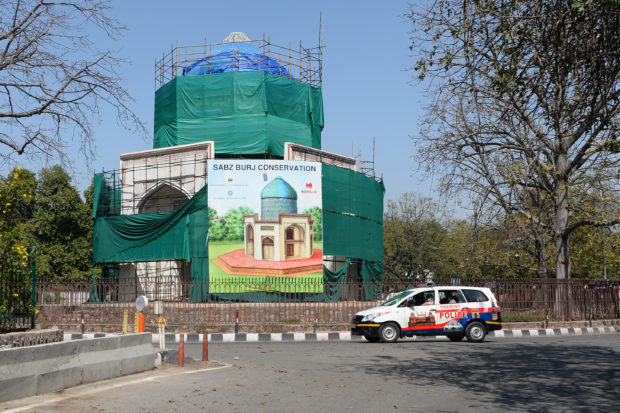Chaos as Modi puts India in total lockdown for three weeks

A police car patrols along a deserted road the day after Indian Prime Minister Narendra Modi announced a 21-day government-imposed nationwide lockdown as a preventive measure against the COVID-19 coronavirus in New Delhi on March 25, 2020. India’s 1.3 billion people will go under “total lockdown” from midnight on March 24 (1830 GMT) for 21 days to combat the spread of the coronavirus pandemic, Prime Minister Narendra Modi said. AFP
NEW DELHI — As India entered a three-week lockdown that started at midnight on Wednesday (March 25), it is facing serious challenges – from ensuring essential groceries and medicines reach people, to encouraging social distancing and helping the poor through a time of wage disruptions.
Prime Minister Narendra Modi on Tuesday announced the biggest lockdown in the world, which will essentially keep 1.35 billion people restricted to their homes in a bid to break the Covid-19 transmission chain.
With cases climbing beyond 500 and 10 deaths, Mr Modi had urged people to stay indoors, warning that a mass coronavirus outbreak would be disastrous for the South Asian country.
The first day saw signs of chaos and ample anecdotal evidence of supply chain disruptions, in spite of assurances to the contrary by the government.
Teething problems reported included police cracking down on vegetable vendors, delivery trucks being blocked at borders and delivery boys being stopped, even though essential services are exempt from the lockdown.
Panic buying was reported from grocery stores. Online grocery providers from Big Basket to Flipkart announced that they were temporarily unable to fulfil deliveries due to logistical issues.
“The lockdown is needed to cut down transmission as tightly as possible, but it poses a number of challenges to people,” said Professor K. Srinath Reddy, president of the non-profit Public Health Foundation of India.
“The government has announced that it will ensure access to essential supplies. We have to wait and see how people are coping with this. It is fairly sudden and somewhat of a severe interruption of daily life.”
India is densely populated, particularly in urban parts, and not all areas have strong health infrastructure.
Social distancing has emerged as a key measure in the fight against the virus. But that is proving to be difficult, particularly with the poor living in crowded spaces.
Water too remains in limited supply in slums, making even something as basic as washing hands frequently difficult.
“For the poor, lockdown is a massive problem. The urban poor live in such close proximity to each other… within one room and outside also there is no space. The rural poor also have big issues because a lockdown isolates them and they don’t get information related to food and health. It is a humanitarian crisis,” said social activist Nikhil Dey, who along with others has urged the government to consider cash handouts of 7,000 rupees (S$132) per month to each poor household for two months, as well as providing free food.
“As far as social distancing is concerned, if you don’t have food or are not well, you are going to break the rules,” said Mr Dey.
The lockdown is expected to be particularly challenging for the poor, who unlike their middle- and upper-class counterparts, would have had difficulty in stocking up on food.
Daily wage labourers are particularly at risk, with the lockdown halting economic activity across sectors. Many who were returning from cities to their rural homes were stranded following the grounding of train services across India due to the lockdown.
Some came up with offers for help for the poor.
“The lockdown’s necessary, but will be devastating for the homeless, daily wage earners and contract workers. If each of us takes care of the daily rations and essentials of at least three less-privileged families, it will have an exponential effect but unlike Covid, it’ll be a ‘good’ virus,” tweeted Mr Anand Mahindra, chairman of Mahindra Group.
The government on Wednesday moved to address some of these concerns.
Federal Minister Prakash Javadekar announced that rice would be available to 800 million of India’s poor at the subsidised rate of three rupees per kilogram instead of 37 rupees, and a kilogram of wheat at two rupees instead of 27 rupees.
“The government is studying the financial impact of the coronavirus – let’s solve the crisis first,” he said.
Still the country is expected to feel the economic cost of the lockdown. India’s economic growth reached a six-year low of 4.7 per cent in the last quarter of 2019. Experts predicted the lockdown would significantly dent India’s GDP growth, making this an even worse year for the economy than the 2008 global financial crisis.
“I expect the lockdown to dramatically reduce GDP in the current and subsequent quarters, while there will be prolonged economic gloom throughout the rest of the year,” said Mr Rishi Sahai, managing director of boutique investment bank Cogence Advisors.
The biggest whammy will be to private consumption, which accounts for 57 per cent of India’s GDP.
Forecasting service Oxford Economics has slashed India’s growth forecast for the first quarter of 2020 to 3 per cent, a number not seen even during the worst of the global financial crisis, Mr Sahai noted.
For more news about the novel coronavirus click here.
What you need to know about Coronavirus.
For more information on COVID-19, call the DOH Hotline: (02) 86517800 local 1149/1150.
The Inquirer Foundation supports our healthcare frontliners and is still accepting cash donations to be deposited at Banco de Oro (BDO) current account #007960018860 or donate through PayMaya using this link.